(An alternative to)
I N P U T S,
O U T P U T S
&
D I S P U T E S
I N P U T S,
O U T P U T S
&
D I S P U T E S
About:
(An alternative to) Inputs, Outputs & Disputes is a musical installation that tends to bring together people uninitiated to music around an instictive musical platform. It tries to bridge the gap between between the performance phisicality and digital ways of creating music.
Conducted by Jérémie Rentien, Stig Steijner, Mehdi Vilquin & Raoul Audouin
(An alternative to) Inputs, Outputs & Disputes is a musical installation that tends to bring together people uninitiated to music around an instictive musical platform. It tries to bridge the gap between between the performance phisicality and digital ways of creating music.
Conducted by Jérémie Rentien, Stig Steijner, Mehdi Vilquin & Raoul Audouin
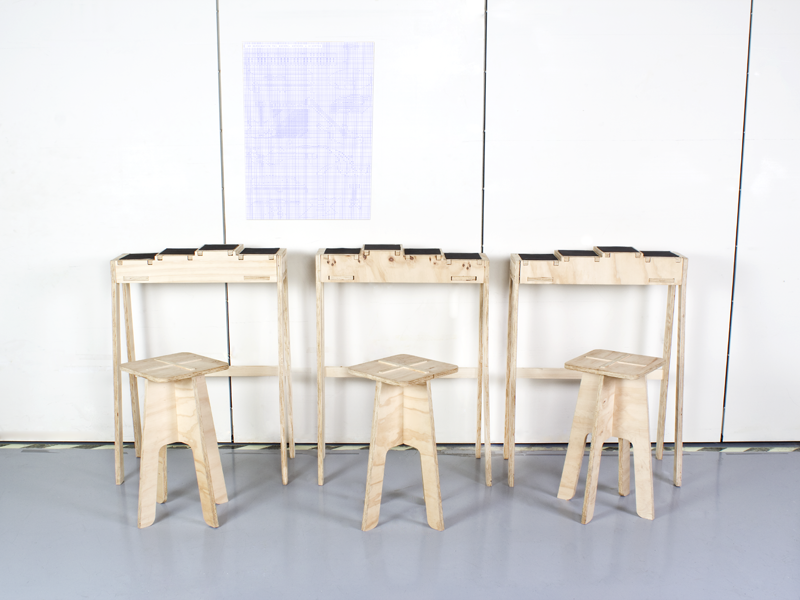
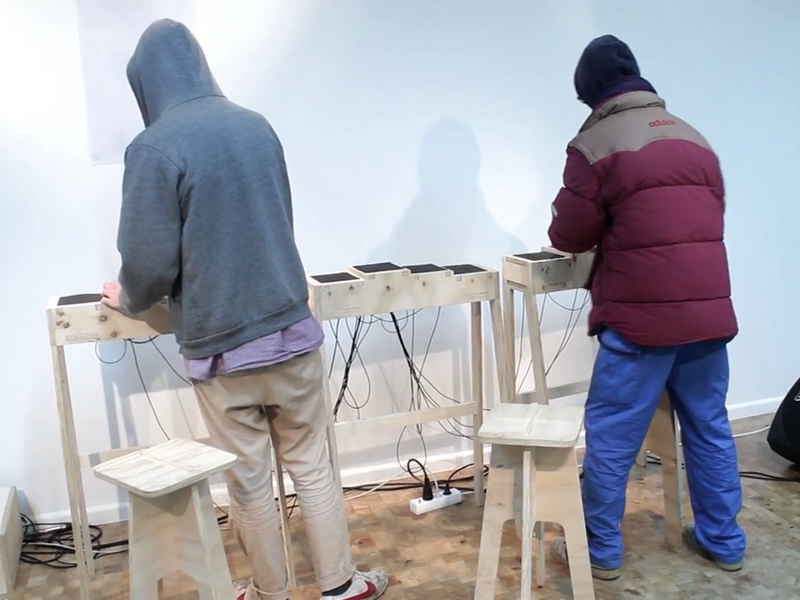
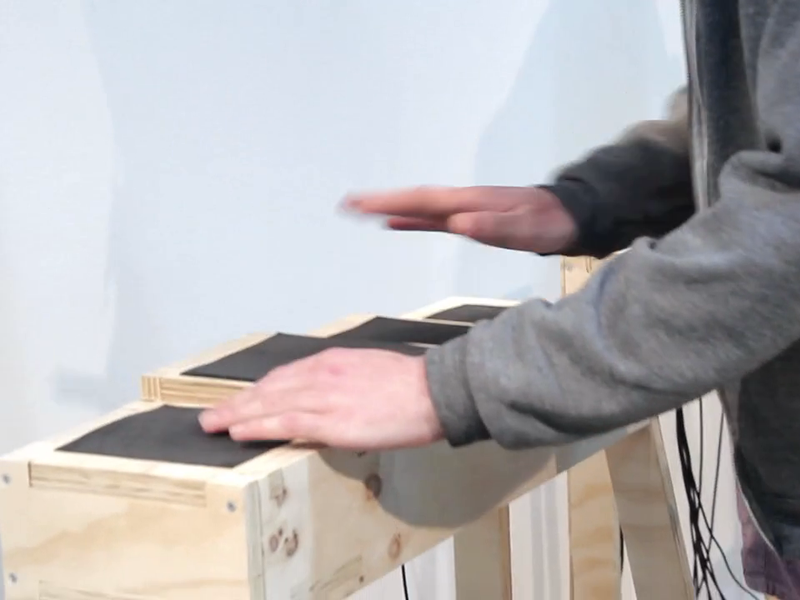
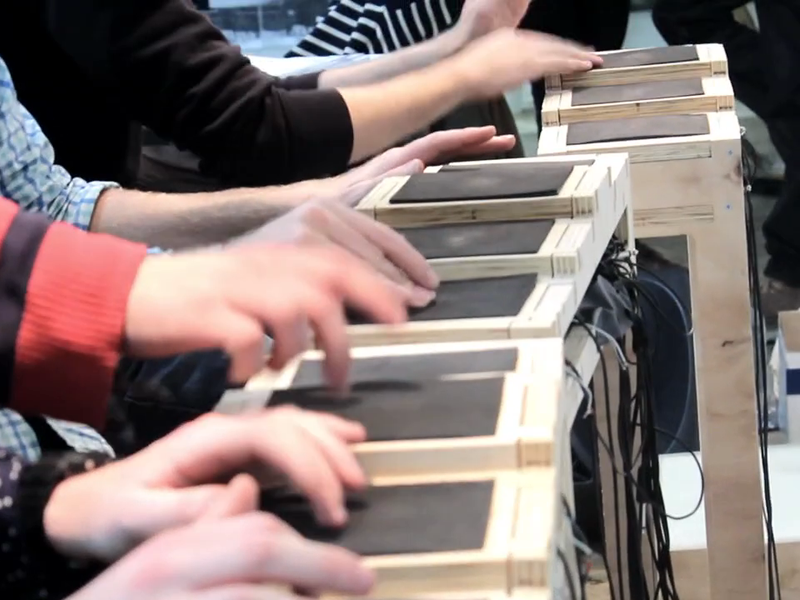
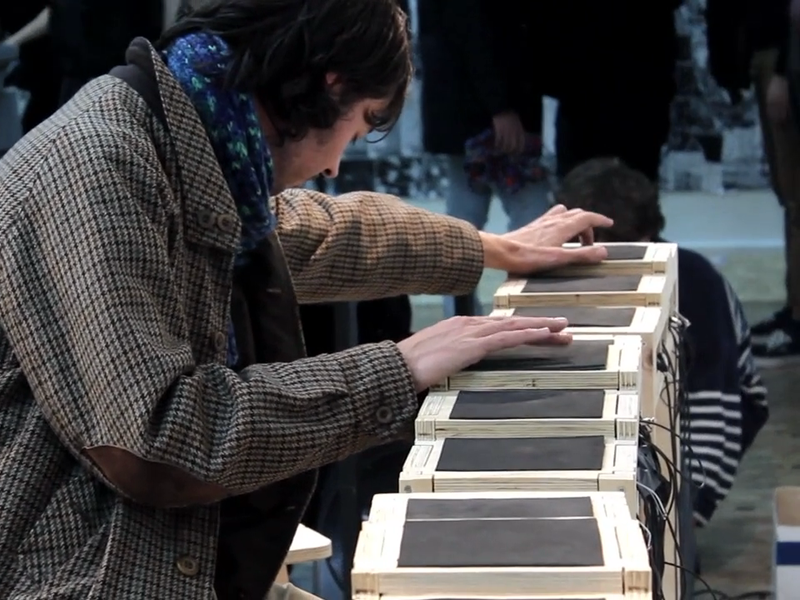
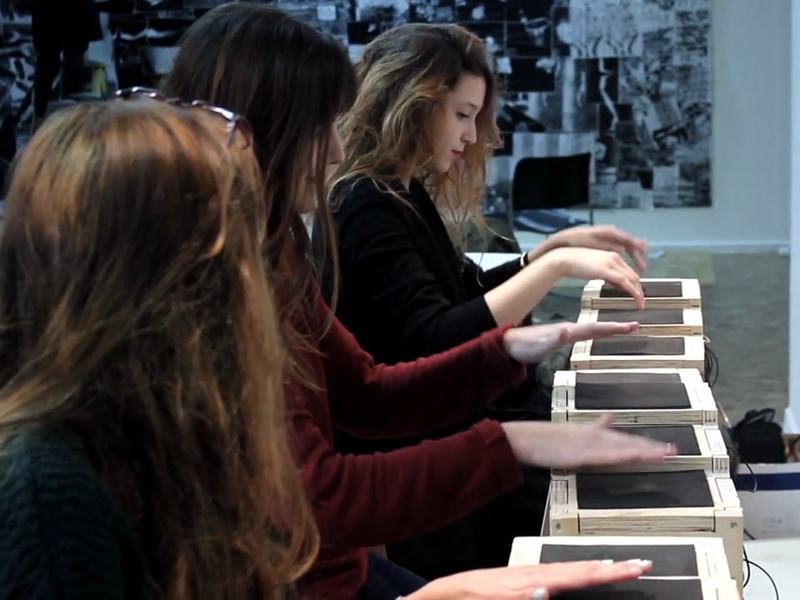
(An alternative to)
Inputs, Outputs & Disputes
Three wooden displays, touch sensitive pads, vibration devices synchronised to the sound wave.
2012
Inputs, Outputs & Disputes
Three wooden displays, touch sensitive pads, vibration devices synchronised to the sound wave.
2012
Poster/Publication, A2, 2 colors, offset printed, 400 copies

↵
VI
A. Music was not a part of my education. My parents were somehow “simple”, we were not able to have this kind of education. My father went to Holland to work, and his all life was dedicated to offer us the life he could not have. Music is an important part of Tunisian culture, but people who can afford musical education have to be rich, it is for elites.
B. I feel really clumsy. I remember in school when we had to learn and practice music, I was just remembering the letters of the melody, and playing this way. So it was not really in a musical way, more like remembering a text.
C. I would say it is like why do religious people believe. A friend say that he doesn’t believe in anything but music. Some people say it with arts, my sister says it for science. With religion, there is this idea of a growing feeling, and it might be the same with music, this idea of a feeling growing can really make you love something.
D. I don’t believe in genius. Some people are talented, but it’s more a matter of learning, the situation in which you are born, and sometimes chance for sure.
E. I really hate that thought to not see something that someone else sees, so somehow that irritates me. I think it is this ability linked to the power of sound, translating vibrations into something recognizable.
F. I don’t really know the potentials so I don’t know what I could do with it. Regarding the fascination that I keep for my Tunisian culture, I guess I would chose a lute if I had to chose an instrument, because this tradition really appeal something to me.
G. I can’t really have an opinion about that. I think it’s something linked to confidence, this fear disappears when you feel more confident with your understanding of music.
×
V
A. Because I never had the opportunity to learn any instruments nor try to play one. No one around me plays music.
B. I really feel like a kid, I mean I have the same ability as a six year old. I guess the pressure of making mistakes is what stops me mostly: That is why I don’t even try. The thing is, when you play an instrument and you make a wrong note you will be able to hear it straight away and that’s really discouraging. If you compare it to football for instance, failing is part of the game, if you lose the ball you can still run and help the others.
C. It’s because they have the passion. I also think that sometimes musicians play because it allows them to free themselves from mental or physical tensions. For example I have a friend who only plays drums to let off steam when he is frustrated: it’s a different kind of medicine.
D. I don’t think someone who would have lived all his life in a box without ever listening to any music would become a music genius. I think it mostly comes from the ability musicians have, learning from the music they listen to. All the references they get from it then determines the way they play and experience music.
E. I guess I’m not losing anything because I don’t play for myself. I think it’s a social thing, I mean, it’s part of the “cultural package”. I really wish I could be the one playing piano at a country house party in the spring.
F. I think because most of the classical instruments have the same shape as when they were created, they have a sort of “museum feeling” that makes them quite valuable.
G. It is more the idea of being listened by people that would stop me, but I don’t play any music so I can’t really answer this question.
×
IV
A. For one reason: I don’t have the time. I think that to be able to play music you have to learn it first. What’s the point of playing if it won’t sound good? Moreover, I don’t have any instruments to start with.
B. A real frustration because I can’t really get the whole potential of the instrument. This unfitness prevents me from enjoying it. Music is sharing, so I have the feeling that to get pleasure you have to give pleasure to the people you’re playing with, or those who are listening to you, and I would not be able to do that.
C. Because maybe they are more patient that I am, or at least make the effort of being so. I think that it takes years to learn and be able to play music. Musicians probably have this patience but I don’t.
D. I think so. Rhythm is the most primal and natural thing, it’s almost something instinctive. I think everyone can play music, it doesn’t require any intelligence or talent: you just have to listen and practice.
E. A sense of beauty and aesthetics. I’m frustrated about that.
F. Compared to most of the objects that surround me, the relationship I have with an instrument is something really different. Maybe because it is something that lasts forever and doesn’t need anything to work. The preciousness of the instrument does that I always feel I have to treat it with respect.
G. I think that when you have the knowledge to play music you cannot be afraid to play in front of people.
×
III
A. I don’t know, I prefer to listen to it. If I play it’s going to sound bad and don’t enjoy it. I often thought that I would try and learn how to play an instrument but never could be asked to.
B. It feels as if I was using all my focus, it’s something complete. You have to do and to listen to what you’re doing at the same time: it’s really trying, way more than when I listen to it.
C. It’s really rewarding I think. They look as if they get a great deal of pleasure from playing. They are in some other realities, a bubble, a bit like actors who would enjoy acting. When I try to play, I get bored quickly and stop. I guess it doesn’t work for me.
D. I think so, personally I don’t have a musical ear. Some people do have it, others don’t. I guess people are not necessarily born with it but maybe the family unit can help. My family doesn’t listen to music that much, that’s why I guess I did not really develop that. I suppose you need someone to transmit you the interest for it and maybe you can then improve.
E. I don’t develop my hearing, maybe I develop something else, like my sight. I lose a new dimension of pleasure.
F. I really like them. When you see one you really want to try it out. The technical aspect of it is kind of fascinating, almost magic because it produces some sort of ancestral sound from nowhere. I have to say that when I see a harp for instance, the idea that you could touch all of those strings and that it would make a sound makes me want to know about how to play it.
G. It’s mostly because I can’t really be asked to learn. If I knew how, I guess I would not be afraid of playing in front of people.
×
II
A. I don’t really know, I guess it’s because it was not a part of my education, I did not chose, and somehow I regret it. In my family I had an input for visual arts, but not for music, or theatre. Maybe if I have time I would like to give it a try.
B. It really depends on the context. I know that I am always afraid to sound wrong (and that happens), but it also gives me fun, trying to find patterns, simple things to play. Anyway I don’t feel confident enough to practice it. If i had more familiarity with music, i could probably go on easily.
C. I guess there is several things. This physicality of playing music, your body involved. Playing music fills something, the space or some tensions as well. I think there’s also just an abstract pleasure that pushes to make music, something really primitive.
D. I think it comes from what was shown to you earlier: not only music in itself, but also the strength to go for it. What makes people who had music in their surroundings talented, is that they always had a condition this motivates you to make it, it’s natural for you.
E. Musicians have something hedonist, careless and maybe somehow I lose that, I fell a bit disconnected from their world. A musician has also a kind of couple with his instrument, and I am a bit a jealous of that.
F. They are intriguing, they have something precious (their box which is like a treasure safe) but I also remember a nice music from John Cage made from paper, so I guess it is more like a tool, and you can make really good music out of everything in a way.
G. It is more creating music as an established form, “that beautiful thing we call music” that stops me.
×
I
A. Simply because I don’t like music enough to play it. I never really felt the need to try even though everyone in my family plays at least four instruments. I learned piano when I was young but I was really bad at reading music and I stopped shortly after.
B. I feel that my ignorance prevents me from trying, because I play music as well as a cat whom would have been given a calculator.
C. The first reason that comes to my mind is the “musician fantasy”. That’s why most of the people start playing music when they are teenagers and able to listen to what they like. Although, a lot of musicians start playing music at first because their parents force them to.
D. I think you have to learn it. Some people are more capable than other to do so.
E. A special feeling I guess. I can see the state of mind that people reach when they play, I probably miss something.
F. It’s a daily life object. I don’t know why but when I was young I put a guitar in my room: maybe I would have liked to be able to play it.
G. It’s just that when I was young I had to learn piano, my parents wanted me to. Now, the idea of playing music is related to “a duty”, almost like a constraint.
(An alternative to)
I N P U T S,
O U T P U T S
&
D I S P U T E S
WHY DON’T YOU PLAY MUSIC?
A — Why don’t you play music?
B — What feelings do you get when you try to play music?
C — Why do you think musicians play?
D — Do you think playing music is a natural ability?
E — What do you think you lose by not playing an instrument?
F — What is your personal relationship to the instrument as an object?
G — Is it the idea of creating music, or performing in front of people that stops you?
Exhibited at Rietveld Uncut
09.11.12 — 10.11.12
Brakke Grond, Amsterdam
09.11.12 — 10.11.12
Brakke Grond, Amsterdam
A
B
C
D
E
F
G
H
I
J
K
L
Samples